Order Chiroptera
This order contains the flying mammals - bats. There are 24 or more species in Singapore.
Bats flying around at Punggol Park ©Tan KH
Megabats (Suborder Megachiroptera)
Megabats are also called Fruit Bats. This suborder contains a single family (Family Pteropodidae). They are fruit/nectar eaters as opposed to the microbats (Suborder Microchiroptera), which are mainly insect eaters (although some feed on blood, fish or nectar).
There are 5 confirmed species in Singapore. 2 others - Island Flying Fox (Pteropus hypomelanus) and Short-nosed Fruit Bat (Cynopterus sphinx) - need to be confirmed.
- Malayan Flying Fox (Pteropus vampyrus) - Rare
- Lesser Dog-faced Fruit Bat (Cynopterus brachyotis) - Common
- Dusky Fruit Bat (Penthetor lucasi) - Uncommon
- Common Long-tongued Fruit Bat (Macroglossus minimus) - Rare
- Cave Nectar Bat (Eonycteris spelaea) - Common
Malayan Flying Fox (Pteropus vampyrus)
This is the largest fruit bat that can be found in Singapore.
Lesser Dog-faced Fruit Bat (Cynopterus brachyotis)
This is the most common fruit/nectar-eating bat in Singapore. It is also known as the Lesser Short-nosed Fruit Bat or Common Fruit Bat. It roosts under broad leaves (e.g. palm, banana leaves) and usually occurs in a group. Although mainly nocturnal, it can sometimes be seen in broad daylight. The female has a yellow collar, while the male has a red collar.
Cave Nectar Bat (Eonycteris spelaea)
This is a dark-coloured bat with greyish belly.
Microbats (Microchiroptera)
Microbats are smaller than the megabats. They are mainly insect eaters, although some eat blood, fish, nectar, fruits and even small mammals. Most use echolocation to detect prey. In 2005, it was thought that only 15 species of microbats are left in Singapore1,2. However, with recent discovery and rediscoveries3,4,5,6, our microbat diversity has took a leap to 19 species.
This raises hope for the rediscovery of the 6 extirpated species: Lesser Woolly Horseshoe Bat (Rhinolophus sedulus), Lesser Brown Horseshoe Bat (R. stheno), Fawn Roundleaf Bat (Hipposideros cervinus), Ridley's Roundleaf Bat (H. ridleyi), Singapore Whiskered Bat (Myotis oreias) and Wrinkle-lipped Free-tailed Bat (Chaerephon plicatus). Of these, the Singapore Whiskered Bat is the most interesting, being the only species thought to be endemic to Singapore7.
There are now 19 species in Singapore.
- Lesser Sheath-tailed Bat (Emballonura monticola) - Rare
- Black-bearded Tomb Bat (Taphozous melanopogon) - Rare
- Pouched Tomb Bat (Saccolaimus saccolaimus) - Common
- Southeast Asian Hollow-faced Bat (Nycteris tragata) - Rare
- Lesser False Vampire (Megaderma spasma) - Rare
- Glossy Horseshoe Bat (Rhinolophus lepidus) - Common
- Trefoil Horseshoe Bat (Rhinolophus trifoliatus) - Rare
- Woolly Horseshoe Bat (Rhinolophus luctus) - Rare
- Bicolored Roundleaf Bat (Hipposideros bicolor) - Rare
- Hardwicke's Woolly Bat (Kerivoula hardwickii) - Rare
- Whiskered Myotis (Myotis muricola) - Common
- Grey Large-footed Myotis (Myotis adversus) - Common
- Lesser Asiatic Yellow House Bat (Scotophilus kuhlii) - Common
- Lesser Bamboo Bat (Tylonycteris pachypus) - Rare
- Greater Bamboo Bat (Tylonycteris robustula) - Uncommon
- Javan Pipistrelle (Pipistrellus javanicus) - Rare
- Narrow-winged Pipistrelle (Pipistrellus stenopterus) - Rare
- Brown Tube-nosed Bat (Murina suilla) - Rare
- Naked Bulldog Bat (Cheiromeles torquatus) - Rare
Lesser Sheath-tailed Bat (Emballonura monticola)
Sheath-tailed Bats are so called because the tail is hidden in the skin between the tails. This species is the smallest of them all, hence its name.
Trefoil Horseshoe Bat (Rhinolophus trifoliatus)
Horseshoe bats are so called because of the facial pattern which looks like a horseshoe. This species has yellow ears.
Whiskered Myotis (Myotis muricola)
This is a common insectivorous bat in Singapore.
References
1. http://www.mbcru.com/index_files/Pottie%20et%20al.%202005--Acta.pdf2. http://www.mbcru.com/index_files/Lane%20et%20al.%202006.pdf
3. Noteworthy microchiropteran records from the Bukit Timah and Central Catchment Nature Reserves, Singapore
4. The Naked Bulldog Bat, Cheiromeles torquatus in Singapore ― past and present records, with highlights on its unique morphology (Microchiroptera: Molossidae)
5. The Javan pipistrelle, Pipistrellus javanicus (Mammalia: Chiroptera: Vespertilionidae) in Singapore
6. The narrow-winged pipistrelle, Pipistrellus stenopterus (Dobson) in Singapore (Mammalia: Chiroptera: Vespertilionidae)
7. http://www.iucnredlist.org/apps/redlist/details/14186/0

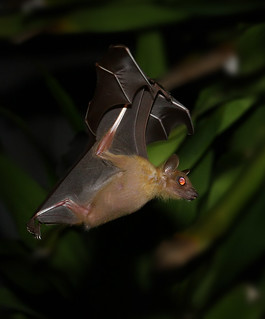
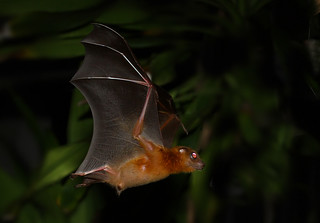
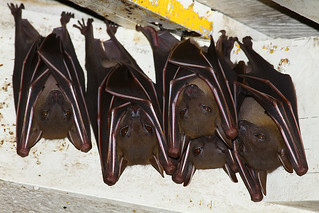



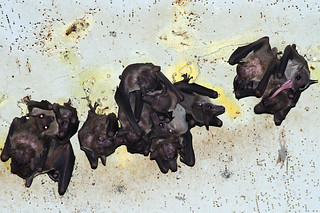
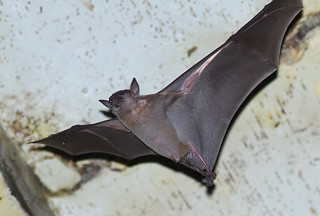



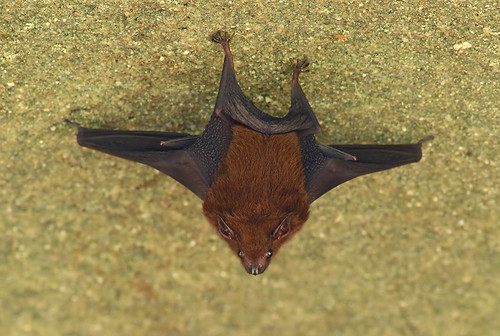


Hi, I found an injured bat on the ground. What should I do?
ReplyDeleteHi, may I know what course of action did you do in the end? Cause I found a baby bat and I don't know what to do as well. I couldn't bear to leave it crawling on the ground as there are many stray cats around.
DeleteIf you encounter such situations in the future, call ACRES Wildlife Rescue
DeleteHotline (24-hour) at 9783 7782.
Do bats carry seeds and sometimes drop them accidentally? I found a very heavy large seed dropped on my lounge carpet - too big for a bird to carry. The next night I noticed a large bat fly in and then back out the open windows and I wondered if bats do carry seeds back to a feeding area?
ReplyDeleteAlso do bats have large poop? We found a large poop on the back verandah which contained a lot of fruit. If it weren't for the fruit contents I would have thought it was from a cat as it was that size. Could this be a large bat?
BTW I live in a landed property in a heavily wooded area close to Orchard Rd.
woah! it sounds as if a flying fox was around your area. i could be wrong but that'd be amazing!
DeleteYes, it does look like it's the bats doing..
ReplyDeleteNice!!! Enjoy bat watching..
I found a small group of bats hunting at sungai somapah near SUTD. They appear to be hunting at the river.
ReplyDelete